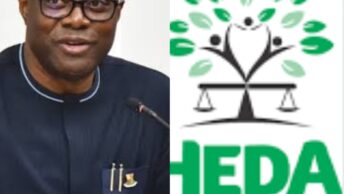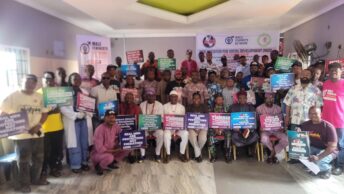If Nigeria does not accelerate its fight against Female Genital Mutilation (FGM) by at least tenfold, the psychological and economic costs of the practice could soar by more than 50 percent in many communities before 2030.
This warning emerged during a two-day media dialogue on ending FGM, which held in Benin on September 24, with a rallying call for men to play a stronger role in halting the practice.

The dialogue, themed “Accelerating Actions to Eliminate Harmful Practices Against Women and Girls,” was organized by the Oyo State Ministry of Information and Orientation in partnership with UNICEF. The gathering brought together journalists, civil society organizations, development partners, and state officials, all united by a sense of urgency to tackle a practice that continues to thrive despite being outlawed.

Nigeria ranks third globally, behind India and Bangladesh, in FGM prevalence. Nearly 20 million women and girls have undergone the procedure, with most cut before their fifth birthday, at an age when they are powerless to resist, consent, or even understand what is happening to them.
“Female genital mutilation is never a choice, but a violation that is inflicted on women and girls,” said Celine Lafoucriere, Chief of UNICEF’s Lagos Field Office, in her welcome address.

“Here is the reality: most of these girls are cut when they are completely powerless. No culture or custom should ever come at the expense of a girl’s health, rights, or her future.”
She acknowledged that while myths and traditions fuel the practice, positive change is taking root. Through national initiatives like the Movement for Good, led by the federal government with UNICEF’s support, millions of Nigerians have pledged to protect girls from being cut.
According to her, communities are speaking out, survivors are leading advocacy, and young people are demanding change. Lafoucriere therefore charged the media to use its storytelling power to amplify survivors’ voices and spark cultural shifts.
“The stories you tell can inspire families to choose differently for their daughters,” she told participants. “Every girl deserves to grow up free of this fear and this harmful possibility.”
Yet the road to ending FGM remains fraught with uncertainty. Dennis Onoise, UNICEF’s Child Protection Specialist, highlighted the devastating toll on survivors, from long-term psychological trauma to complications during childbirth and heightened health risks later in life.
“FGM robs girls of their dignity and inflicts wounds that last a lifetime,” Onoise said. “Beyond the human suffering, the economic burden is immense — draining families, communities, and the healthcare system. That cost could rise by 50 percent before 2030 if urgent measures are not taken.”

OOnoise maintained that collaboration is key: “FGM practice can end ten times faster if stakeholders, from lawmakers to law enforcement, from traditional leaders to the media, must work together with clear commitment.”
Adding her voice, FGM consultant Mrs. Aderonke Olutayo challenged stereotypes about the practice. “Many of the so-called benefits are myths,” she said. “In reality, FGM weakens communities. The media must set the agenda, raise awareness, and dismantle these harmful beliefs that continue to put women and girls at risk.”
Meanwhile, Blessing Ejiofor, UNICEF’s Communication Officer in Lagos, explained that the dialogue was designed to deepen participants’ understanding of the devastating impact of FGM and equip them with advocacy tools. “Journalists are crucial in reframing public narratives,” she said, “especially across Southwest Nigeria, where prevalence remains stubbornly high.”
Stakeholders at the event pledged to push for increased budgetary allocation to fight FGM and to strengthen collaboration with State Houses of Assembly and law enforcement agencies to enforce existing laws.












